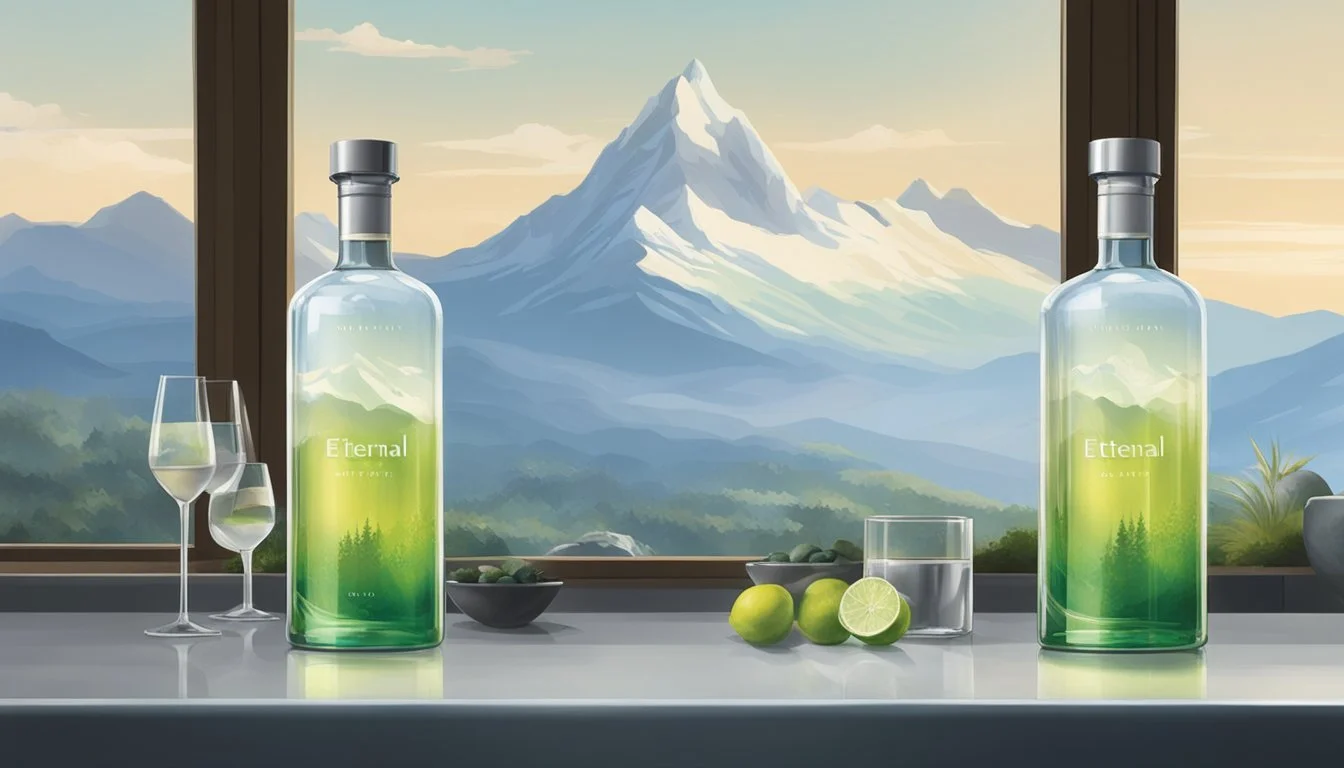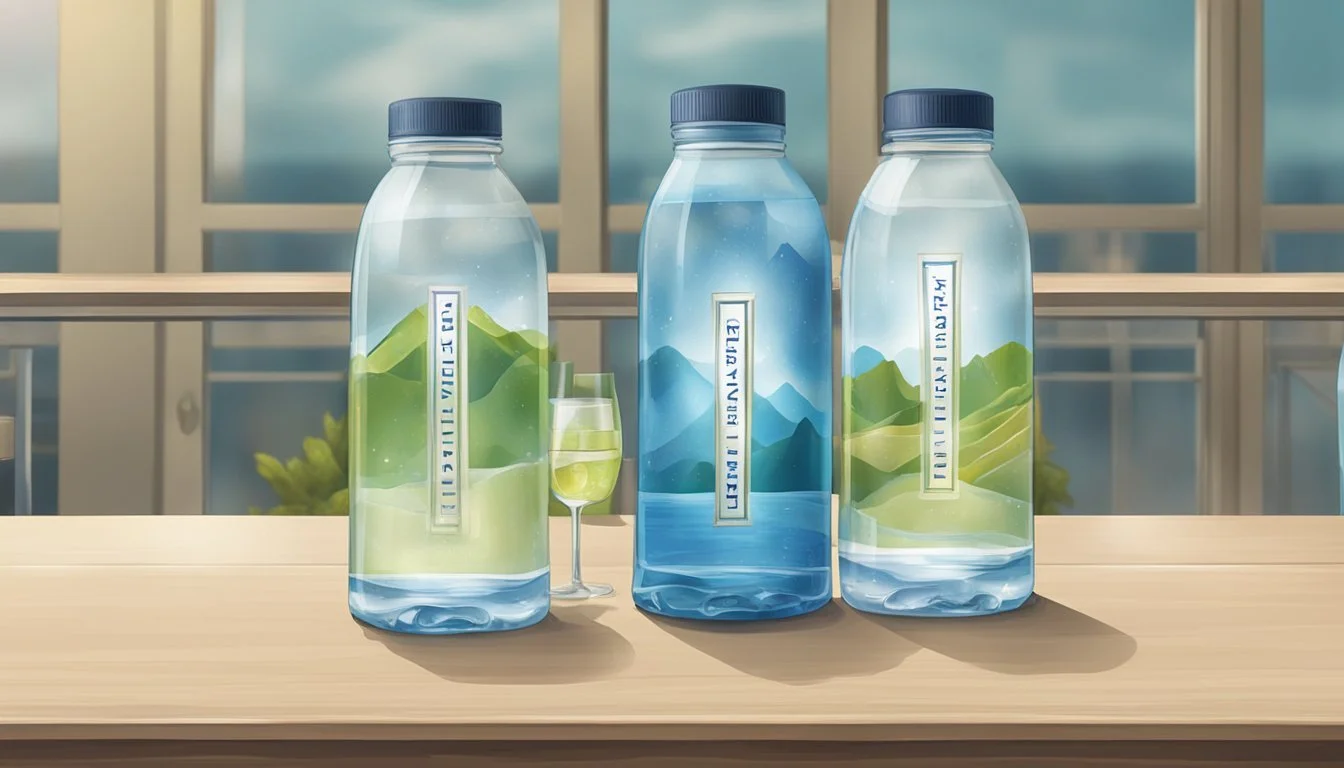Eternal vs. Ethos
Bottled Water Comparison for the Informed Consumer
In the realm of bottled water, brand choice can often reflect personal values and preferences, particularly when comparing options like Eternal and Ethos. Eternal water, sourced from springs and known for its natural minerals, touts a naturally alkaline quality that many health-conscious consumers seek. On the other hand, Ethos Water, with its pledge to contribute to humanitarian water programs, appeals to those looking to make an ethical choice with their purchase.
The consideration goes beyond taste and price; it taps into health benefits and social responsibility, two factors consumers weigh heavily. While Eternal prides itself on offering a water that maintains a balance of electrolytes and minerals beneficial to the body, Ethos emphasizes its mission to provide children with access to clean water, branding it not just a product but a socially-driven initiative.
Navigating these waters becomes a task of comparing the intrinsic properties of the water with the impact each purchase has on the broader world. The question isn't simply about which water is better on a sensory level, but which aligns more closely with the consumer's priorities—optimal hydration or global awareness.
Brand Profiles
In comparing Eternal Water and Ethos Water, consumers consider factors such as source, taste, and corporate responsibility.
Eternal Water
Eternal Water is sourced from natural springs in the United States, where it naturally acquires minerals and electrolytes. The brand prides itself on providing water that is naturally alkaline, with a pH balance that is believed to benefit hydration. Their bottling process aims to maintain the water's original mineral content and pH level.
Source: Natural springs
PH Level: Naturally alkaline
Corporate Responsibility: Focus on retaining natural purity
Ethos Water
Ethos Water, owned by Starbucks, operates with a philanthropic mission. For every bottle sold, a portion of the proceeds goes towards water, sanitation, and hygiene programs in water-stressed countries. Ethos Water is purified, and its sale supports efforts to provide communities with access to clean water.
Owner: Starbucks
Purification: Purified water
Corporate Responsibility: Provides funds for clean water programs
Source and Purification
When assessing bottled water brands like Eternal and Ethos, two critical factors to consider are the quality of their natural water sources and the sophistication of their purification techniques.
Natural Sources
Eternal water is sourced from natural springs, where the water is naturally filtered through layers of the earth, obtaining minerals in the process. The company claims its water comes from a protected underground spring that is also naturally alkaline, owing to the presence of volcanic rock.
Ethos, on the other hand, primarily uses filtered tap water. It often undergoes further purification, but lacks the natural minerals and properties associated with spring sources like those of Eternal.
Purification Techniques
Eternal water's purification revolves around maintaining the natural alkalinity and mineral content of its spring water. They minimise intensive purification to preserve the water's original state, ensuring that the naturally occurring minerals remain intact to provide a unique taste and potential health benefits.
Ethos water employs a seven-step purification process termed Hydro-7™, designed to filter the water to a high level of purity. This process includes stages such as reverse osmosis and disinfection to eliminate contaminants, as well as additional steps to enhance the water, perhaps with added minerals, for a consistent taste and quality. Despite the purified nature of Ethos water, it may lack the distinctive mineral profile that some consumers seek from natural sources like alpine or mountain spring waters.
Health and Hydration
When comparing Eternal and Ethos in terms of health and hydration, two key factors come into play: the hydrating properties of the water and any health benefits or risks associated with the brands.
Hydrating Properties
Both Eternal and Ethos water aim to serve the primary purpose of hydration. Eternal is known for its naturally occurring electrolytes, such as potassium, calcium, and magnesium. These electrolytes are crucial for maintaining hydration and supporting various bodily functions. Ethos, often sold at Starbucks, also provides hydration but does not promote electrolyte content as a unique selling point.
Eternal Water:
Electrolytes: Yes (naturally occurring)
Ethos Water:
Electrolytes: No specific mention
Health Benefits and Risks
Health Benefits: Eternal asserts that its alkaline water is beneficial because it can help to neutralize acid in the bloodstream, which proponents say leads to increased oxygen levels and improved energy and metabolism. However, the scientific community has not reached a consensus on these claims.
Ethos water contributes to health by pledging to provide children with access to clean drinking water. Each purchase supports their mission, indirectly promoting better health in communities lacking water resources.
Eternal Water: Ionized alkaline water
Ethos Water: Advocates for clean drinking water
Health Risks: Both brands are required to meet FDA and EPA standards for bottled water, ensuring they are free from contaminants such as Bisphenol A (BPA). Any risks associated with bottled water, in general, could be related to environmental concerns and the presence of microplastics, which are currently under study for their health implications.
Consumers prioritizing a healthier alternative should look for bottles marked "BPA-free" and consider the ecological impact of their choice.
BPA: A risk if present in packaging
EPA/FDA: Bottled water standards
Microplastics: Potential concern under research
While Eternal and Ethos both offer effective hydration, the presence of naturally occurring electrolytes in Eternal may provide an edge in hydration efficiency. It should be noted that the health benefits associated with alkaline water are not universally accepted and warrant further research for conclusive evidence. Both brands offer a clean drinking water option, though Ethos stands out for its ethical commitment to addressing global water access.
Quality and Taste Analysis
When considering Eternal and Ethos bottled waters, one measures quality by pH levels and mineral content, which in turn influences the taste. These factors are pivotal in determining which water might be better for certain palates or health-conscious individuals.
pH Levels and Alkalinity
Eternal bottled water touts a natural alkalinity due to its mineral content, resulting in a higher pH level which typically ranges above 7.5. Alkaline water is often favored for its purported health benefits and smoother taste. On the other hand, Ethos, which is typically sold by Starbucks, is purified water and maintains a neutral pH closer to 7, which is considered optimal for matching natural body pH.
Mineral Content and Flavor
Eternal water is known for its essential minerals such as calcium and magnesium, derived from natural sources. These minerals can enhance the flavor of the water, giving it a distinct taste that can be described as fresh and crisp. Ethos water, while it contains fewer minerals due to its purification process, ensures a clean flavor that may appeal to those preferring a more neutral taste without strong mineral notes. The presence of electrolytes in Ethos aims to improve taste and provide a refreshing experience.
Both brands provide their own unique taste experiences influenced by their pH levels and mineral content, catering to varying preferences in bottled water consumption.
Environmental and Sustainability Considerations
When considering bottled water options, the environmental footprint and sustainability practices of the brand are critical factors. The choice between Eternal and Ethos water brands should not only satiate thirst but also align with eco-friendly practices.
Packaging and Plastic Waste
Eternal water bottles are designed to be BPA-free and fully recyclable. They prioritize reducing plastic waste through a recycling program that encourages consumers to recycle their bottles. The use of PET plastic is representative of an industry move toward sustainability but still carries an environmental impact due to its production and post-consumer waste concerns.
Packaging materials: BPA-free PET plastic.
Recycling initiatives: Encourages consumer participation in recycling.
Ethos, on the other hand, places a significant emphasis on sourcing packaging from recycled materials, aiming to lower their production of new plastics. They also engage in campaigns to raise awareness about the importance of recycling to curb plastic waste. However, the environmental impact of even recycled plastics is non-negligible, and Ethos continues to explore more sustainable packaging solutions.
Packaging materials: Utilizes recycled plastics.
Environmental campaigns: Promotes recycling and waste reduction.
Sourcing and Eco-Friendliness
The sourcing of water for Eternal involves a process that respects natural ecosystems, striving for minimal disturbance to the environment. They assert that their impact on local water tables is strictly monitored to ensure sustainability.
Ethos takes a different approach by investing in water access initiatives as part of its brand ethos. With each purchase, a portion of the profit is directed towards sustainable water programs in underprivileged communities. This brand's commitment extends beyond the eco-friendliness of their product to include a global perspective on water resource management.
Both brands continue to explore new methods to minimize their environmental impact through eco-friendly practices and ongoing assessments of their sourcing strategies.
Cost Comparison
When evaluating the cost of bottled water, consumers often consider both price per bottle and price in bulk. Eternal and Ethos are two brands that provide distinctly different price points reflective of their market positioning.
Eternal Water: This brand is known for its premium natural alkaline water sourced from protected underground springs. Pricing for Eternal varies by region and retailer but generally falls within the mid to high range for bottled waters.
Single 1.5-liter bottle: $2.29 - $3.50
Case of 12 x 1.5 liters: $27.48 - $42.00
Ethos Water: Ethos prides itself on social responsibility, with a portion of its sales going to water-relief programs. It is commonly found in Starbucks locations, and although it is positioned as a socially conscious choice, it is often priced comparably to other premium bottled waters.
Single 23.7-ounce bottle: $1.95 - $2.50
Case of 12 x 23.7 ounces: $23.40 - $30.00
It should be noted that prices can fluctuate widely based on the point of purchase, current promotions, and geographic location. Additionally, buying in bulk typically results in a lower cost per unit.
Costs reflect not just the water quality but also packaging, distribution channels, and brand marketing. Eternal often presents a higher price point, justified by its sourcing and potential health benefits. Conversely, Ethos aligns its price with charitable contributions, which may be a deciding factor for socially-conscious consumers. Each brand offers unique value propositions that extend beyond the mere cost of the water itself.
Consumer Convenience
When it comes to choosing between Eternal and Ethos bottled waters, convenience is a crucial factor for consumers. Eternal Water is known for its naturally alkaline source, with water that travels through mineral-imbued aquifers. This can sometimes mean a higher price point and less availability. Consumers may find Eternal Water more frequently in health food stores or specialty shops rather than in local grocery stores.
On the other hand, Ethos Water takes a different approach. Part of its appeal is its pledge to provide children around the world access to clean water, which resonates with many consumers. Ethos Water is often found in Starbucks locations, as it is owned by the coffee giant, as well as being readily available in various local grocery stores. Its widespread distribution network increases its convenience factor significantly.
Here's a quick comparison of their availability:
Distribution Points Eternal Water Ethos Water Health Food Stores Common Less common Specialty Shops Common Less common Local Grocery Stores Less common Common Starbucks Locations Unavailable Common
In terms of packaging, both brands offer a range of sizes from single-serving bottles to multi-packs, which provides flexibility depending on the consumers' needs. However, the more extensive presence of Ethos Water in mainstream outlets generally means that consumers looking for greater convenience may lean towards Ethos.
Comparative Analysis
This section offers a critical examination of Eternal and Ethos bottled waters, dissecting their merits and drawbacks while also presenting top choices for consumers.
Pros and Cons
Eternal Bottled Water:
Pros:
Sources water from naturally occurring springs.
Has a naturally high pH, often preferred for its alkaline properties.
Free from artificial additives and preservatives.
Cons:
Can be more expensive than other brands.
Availability may be limited in certain regions.
Ethos Bottled Water:
Pros:
Dedicated to sustainability, with a portion of proceeds aimed at water-related causes.
Offers added minerals for taste and health benefits.
Cons:
Lacks the natural sourcing of some competitors, which may affect taste preferences.
Ethos has been scrutinized for its association with larger corporations and the ethical implications thereof.
Top Picks
The industry presents a plethora of options when it comes to bottled water. Amidst the competition, certain brands consistently rise to the top due to their quality, taste, and ethical practices.
Eternal:
Recognized for its natural alkalinity and pure taste.
Often recommended for those seeking water with minimal human intervention.
Ethos:
Gains consumer support for its charitable contributions and focus on global impact.
Valued for its consistent taste and accessibility.
Discerning the "best" bottled water inherently depends on customer priorities, such as taste preference, source purity, cost, and environmental impact. Both Eternal and Ethos have their unique selling points that cater to different segments of the market.
Expert Insights
In assessing the quality of bottled water brands Eternal and Ethos, both sommelier perspectives and scientific evaluations offer critical viewpoints.
Sommelier Opinions
Sommeliers are trained to detect and appreciate the subtle differences in taste, which extend beyond wine to include water. They often conduct taste tests to determine the flavor profile and sensory experience of water. Eternal water has been praised for its natural purity and balanced mineral content, which can affect the mouthfeel and overall enjoyment. In contrast, Ethos water is often identified for its commitment to social responsibility, but its taste profile tends to be less distinct.
Scientific Findings
Scientific analysis of bottled water primarily focuses on the composition of minerals and the presence of contaminants. The tested levels of minerals such as calcium, magnesium, and potassium can contribute to both the health benefits and the taste of the water. Eternal water boasts a natural alkaline pH, which is a result of its filtration through volcanic rock. Ethos water, sourced from various springs and public water sources, undergoes a rigorous purification process, ensuring that it meets strict safety standards.
Mineral Content Analysis:
Brand Calcium (mg/L) Magnesium (mg/L) Potassium (mg/L) pH Level Eternal High Moderate Low Alkaline Ethos Moderate Low Low Neutral
Scientists also test for harmful substances, such as heavy metals, microplastics, or bacterial contaminants, to certify the safety of the bottled water. Both Eternal and Ethos have been found to be free from contaminants and safe for consumption.
Final Verdict
When evaluating Eternal versus Ethos, several factors such as source, taste, and environmental impact were taken into account.
Eternal water is sourced from natural springs and boasts a unique mineral profile. Consumers often report a clean, fresh taste, which could be attributed to its natural filtration process. Eternal also emphasizes sustainability, utilizing recycled materials for its packaging.
Ethos, on the other hand, is a brand with a mission, promising to help fund water programs in developing countries. This brand is typically purified via reverse osmosis, resulting in a consistent and clean taste. However, it lacks the natural minerals found in spring water.
Feature Eternal Ethos Source Natural springs Purified Taste Fresh, mineral-rich Consistent, clean Environmental Impact Recycled materials Funds water programs
In terms of health and sustainability, Eternal may have an edge due to its natural source and emphasis on eco-friendly practices. However, consumers who value ethical initiatives may prefer Ethos for its commitment to global water aid.
Thus, one's preference for Eternal or Ethos will significantly depend on individual priorities, whether they lean towards the natural composition and eco-friendliness of Eternal or the philanthropic ethos and clean taste of Ethos.








